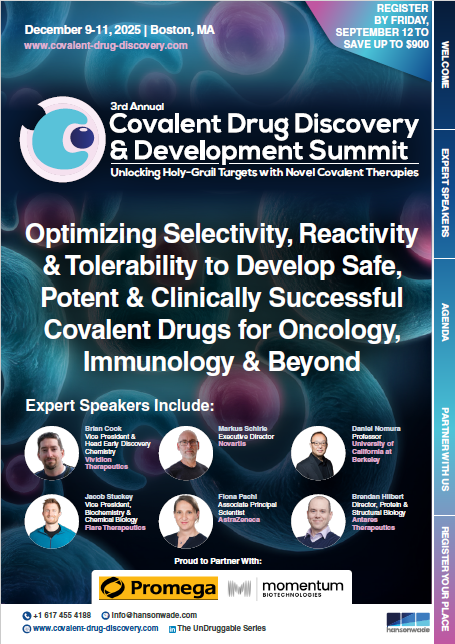8:30 am Check In & Light Breakfast
9:20 am Chair’s Opening Remarks
Transforming Hit to Lead Optimization with Strategic Hit Triaging & Warhead Modification to Develop Sufficiently Potent & Selective Covalent Drugs
9:30 am Reimagining Druggability Using Chemoproteomic Platforms
Synopsis
- Covalent chemoproteomic approaches for drugging undruggable targets such as transcription factors
- Covalent approaches to expand upon targeted protein degradation platforms
- Covalent approaches to develop new induced proximity-based therapeutic modalities beyond degradation
10:00 am Discovery of RMC-9805, an Oral, RAS(ON)G12D-Selective Covalent Tri-Complex Inhibitor
Synopsis
- The investigational agent RMC-9805 is a first-in-class, orally bioavailable, mutant selective covalent inhibitor of RASG12D(ON) that forms a tri-complex between the abundant intracellular chaperone cyclophilin A (CypA) and the “ON” state of RASG12D, enabling selective covalent engagement of Asp-12 and disrupting downstream RAS signaling by steric occlusion of effector binding
- RMC-9805 drove selective and persistent covalent modification of KRASG12D in human cancer cell lines in vitro, leading to deep and durable suppression of RAS pathway activity, inhibition of cell proliferation, and apoptosis
- RMC-9805 monotherapy induced tumor regressions at well-tolerated doses in a majority of preclinical PDAC and NSCLC models harboring KRASG12D
10:30 am Fireside Chat: Improving Lead Optimization to Advance Hits into Potent, Tolerable & Clinically Successful Covalent Therapies
Synopsis
- Strategizing for successful hit to lead optimization by overcoming bottlenecks in clearance, target occupancy, and selectivity
- Adapting lead optimization as compounds move through the development pipeline from in vitro to in vivo models
- Lessons learn from abandoned candidates and emerging trends of which sites are most suitable for therapeutic development
11:00 am Morning Break & Networking
Streamlining Translation of Covalent Candidates through Smart Drug Development & Accurate Understanding of Dosing Regimens to Bring Therapies to Patients Faster
11:45 am A Covalent-First Approach to Identify Novel Drug Targets
Synopsis
- Building a covalent-first fragment library (design principles)
- Generation of scout ligands/stereoprobes
- Optimization of covalent-first hits/balancing electrophile reactivity
- Evaluation of the types of pockets accessible through this approach
12:15 pm Round Table: Measuring Target Occupancy, Affinity & Efficacy with Advanced Tools & Models to Guide Warhead Optimization
Synopsis
- Tools and technologies for measuring target occupancy and assessing the accuracy of occupancy models including PBBK, QSP and SPR
- Debating the application and usefulness of KI / Kinact measurements for kinetic optimization
- Evaluating the relationship between PD, efficacy and target engagement and tuning warheads in response
12:45 pm Lunch Break & Networking
Exploring the Untapped Potential of Covalent Biologics & Non-Inhibitory Covalent Molecules to Treat a Greater Range of Indications & Patients
1:45 pm Leveraging Covalency to Achieve Optimal Pharmacokinetic Profiles for Radiotherapeutics
Synopsis
- Introduction to Radiotherapeutics and why they require a unique pharmacokinetic profile
- Discuss the concept of covalency and how it fits in Radiotherapeutics
- Provide examples of covalency in developing superior Radiotherapeutics – an example from the FAP (fibroblast activation protein) field
2:15 pm Discovery of Bispecific T-Cell Engagers Targeting Covalent Drug-Modified KRASG12C Neoantigens
Synopsis
- Development of engineered bispecific T-Cell engagers that recognize KRAS covalent inhibitor–modified peptide-MHC complexes with high affinity and specificity
- Companion immunotherapy approach designed to complement KRASG12C inhibitors enabling selective killing of resistant tumor cells in vitro and in vivo
- Cross-HLA binding and structural insights supporting broad patient coverage and the molecular basis for recognition of hapten-modified targets
2:45 pm Beyond Inhibitors: Developing Covalent Activators with the Potential to Transform Treatment Options for Patients
Synopsis
- Exploring covalent activators as an advantageous alternative to covalent inhibitors
- Data to demonstrate the unique benefit of using non-inhibitory covalent compounds in terms of selectivity and potency
- Outlining the future development strategy for covalent activators to enable progression into the clinic

